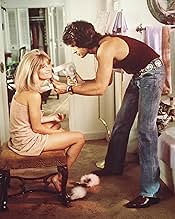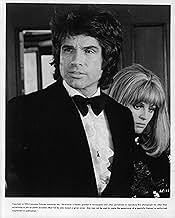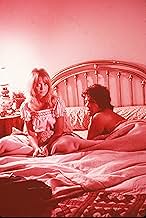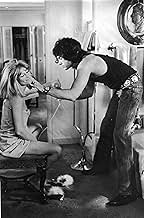Aggiungi una trama nella tua linguaOn Election Day, 1968, irresponsible hairdresser and ladies' man George Roundy is too busy cutting hair and dealing with his girlfriends and mistress Felicia Karpf, whose husband Lester is h... Leggi tuttoOn Election Day, 1968, irresponsible hairdresser and ladies' man George Roundy is too busy cutting hair and dealing with his girlfriends and mistress Felicia Karpf, whose husband Lester is having an affair with his ex-girlfriend Jackie.On Election Day, 1968, irresponsible hairdresser and ladies' man George Roundy is too busy cutting hair and dealing with his girlfriends and mistress Felicia Karpf, whose husband Lester is having an affair with his ex-girlfriend Jackie.
- Vincitore di 1 Oscar
- 3 vittorie e 11 candidature totali
Recensioni in evidenza
Here in the updated "Shampoo", Beatty and Towne make the hero an assumed-to-be-gay hairdresser (instead of impotent)and the results are inspired bedroom farce mixed with social satire.
Younger viewers may find the film a little dated but it was a "period" film when it was made (set in 68 when it was shot in 74) so Ashby consciously gave it that dated look. For me this and Heaven Can Wait are Beatty's best work. Walks a fine comic/tragic line. And this really feels like the closest character to Beatty's heart. It was after this that I went back and saw Splendor in the Grass and began to appreciate Beatty as an actor rather than just a gigolo celebrity.
Great dialogue by Towne, Jack Warden's hilarious and Julie Christie is stunning.
Shampoo is a sex comedy in that most, if not all, of its jokes revolve around sex, or at least the implication that sex has taken place or might be about to take place. As a result it is arguable that the comedy is a bit thin and repetitive, and it is true that the story is hardly bursting with riotous wit. And yet ace screenwriter Robert Towne constructs situations that are funny in their believable social awkwardness. They might only raise a chuckle or two over the course of a scene, but they have an almost soap opera quality which keeps us watching. Besides, there's a bit more going on here than bedroom humour. The decision to set it seven years in the past seems strangely arbitrary at first, but it has a surprisingly moving impact when political events start to creep into the narrative, and Warren Beatty's womanising antics are put into some perspective.
Like all comedies, a lot of its success or otherwise depends on the acting performances. This was largely an age of realism in acting, but here the performances are just on the comedic side of real. Nobody does anything which is exactly funny in its own right, but it often is funny in its timing and context. For example, there is Beatty's mumbled excuse to Carrie Fisher (whom he has just had sex with) when he is dragged off by Lee Grant (who intends to have sex with him). Similarly, a lot of Jack Warden's self-important manliness is funny in the context of the fact that Beatty is busy screwing his wife, mistress and teenage daughter. Lee Grant gives another of her typically attention-grabbing minor roles, the authoritative society lady one minute, girlishly sipping a soft drink through a straw the next. Returning to Beatty, I'm also vaguely amused by the way he emphasises the last syllable in "pancreas" during the first scene, as if it's some kind of ass.
The director here is Hal Ashby, a really fine craftsman of 70s cinema with a deceptively simple approach. He doesn't move the camera much, and often keeps back a bit from the action, not in a cold, distant way but more to show everything that is going on in a scene and allow the actors' body language to come across as well as facial expression. This is even effective for the comedy, such as in the scene where Beatty trashes the bin outside the bank, in which the wide shot makes him look somewhat pathetic in his anger. When Ashby does move the camera it is usually to give an impression a setting or situation, often with beautiful economy, and nearly always disguised by following the movement of a character. Take the shot which introduces Jack Warden's home life. He enters from one end of the room, kisses his daughter in mid-shot and surrounded by lots of colour. Then as he crosses what turns out to be a rather large room, the camera wheels round, to reveal his wife sitting alone amid stark white furnishings. An editor before he took up directing, Ashby clearly knows the potentially comedic value of a well-timed crosscut. For example, after the scene in which Warden discusses whether or not Beatty is "a fairy", we cut to a shot of Beatty blow-drying a woman's hair, her face virtually in his crotch.
But there is one thing that makes Shampoo really stand out, and this is something which comes both from Ashby's direction and the Towne/Beatty screenplay: Despite coming from a more liberated era, it still has the artful good taste of the sex comedies of the 30s. It resists the temptation to become soft porn or a string of gross-out jokes. There is only a little partial nudity, and for the most part we do not see much of the sex acts, only their beginnings and aftermaths. And this is an era in which a fairly graphic sex scene was fast becoming a staple of any romantic movie. Despite its being a comedy almost wholly concerned with one man's sexual adventures, Shampoo is a surprisingly mature and refreshingly intelligent motion picture.
Structurally, "Shampoo" is brilliantly devised. Each character has an opposite. George, the satyr, has Lester, the cuckhold, as his opposite. George exudes natural sexual appeal, whereas Lester is loved merely for his wealth. Tony Bill's character, an ad executive, is the younger version of Lester. Tony Bill dangles a job offer to Goldie Hawn in order to bed her. Despite his hip outward appearance, this character is as staid as Lester. In fact, the two characters are linked by separate scenes in which each one stares out of a skyscraper window, gazing at a panoramic view of L.A., and makes a world-weary comment about the craziness below (in Bill's case, he says, "Jesus, this town"). There is also a contrast between George and Jackie. George, in his own words, "doesn't f*** for money, I do it for fun," whereas Jackie ends up as a kept girl (by Lester). Goldie Hawn's character also prostitutes herself, in a very subtle way. In the moral universe of Beverly Hills in 1968, Beatty's promiscuity seems more pure than the money-driven machinations of everyone else.
Lee Grant won an Oscar for playing Lester's bored wife who can't seem to take her eyes off Beatty, and even her nymphet daughter (a young Carrie Fisher) desperately wanted him to be engaging in reciprocal sex Grant's actually quite jovial and adorable in her role as we heartily feel for her character near the climax
Warren Beatty appears either excitable or distracted through most of the story He lies, hides, and denies facts, doing whatever it takes to make everyone happy...
If you like to see Julie Christie notoriously fellating Beatty underneath an elegant dinner table well don't miss this funny sex comedy which received four Oscar nominations
Lo sapevi?
- QuizLovers off and on since 1967, Warren Beatty and Julie Christie broke up for good during the making of this movie. They remained friends and later worked together in Il paradiso può attendere (1978).
- BlooperThe Coca-Cola can George drinks from while chatting with Lorna is a post-1968 design.
- Citazioni
George Roundy: Can't we just, eh, be friends?
Lorna: Okay.
[teen-aged Lorna makes George an offer he can't refuse]
Lorna: You wanna fuck?
- Curiosità sui creditiIn the opening credits, horror film producer/actor William Castle is billed as "Bill Castle," but in the end credits he is back to "William Castle."
- ConnessioniFeatured in Precious Images (1986)
- Colonne sonoreWouldn't It Be Nice
(1966) (uncredited)
Music by Brian Wilson
Lyrics by Tony Asher, Mike Love and Brian Wilson
Performed by The Beach Boys
I più visti
- How long is Shampoo?Powered by Alexa
Dettagli
- Data di uscita
- Paese di origine
- Lingua
- Celebre anche come
- Sosyete kuaförü
- Luoghi delle riprese
- 2270 Bowmont Drive, Beverly Hills, California, Stati Uniti(Jackie's House at Bowmont & Hazen)
- Aziende produttrici
- Vedi altri crediti dell’azienda su IMDbPro
Botteghino
- Budget
- 4.000.000 USD (previsto)
- Lordo Stati Uniti e Canada
- 49.407.734 USD
- Lordo in tutto il mondo
- 49.407.734 USD
Contribuisci a questa pagina


































